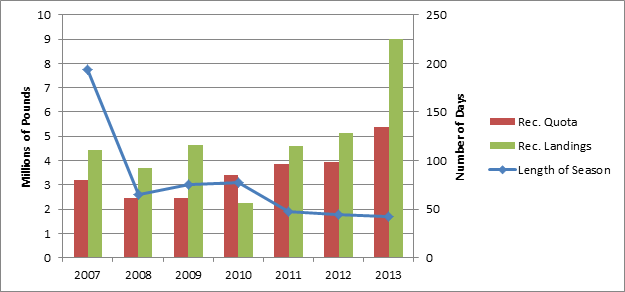Lawsuits and lasting solutions for the Gulf’s red snapper fishery
For media inquiries please contact:
Matt Smelser, msmelser@edf.org, (202) 572-3272
EDF takes another step today in our decades-long pursuit of vibrant, productive fisheries in the Gulf of Mexico when we file an amicus brief in an ongoing lawsuit over the red snapper fishery. The issue at hand is whether NOAA violated federal law in its management of the recreational sector, allowing significant overharvesting and in so doing potentially jeopardizing one of the nation’s biggest success stories in fisheries recovery. It’s always unfortunate when fisheries challenges end up in the courtroom. In this instance, we hope that there’ll be a simultaneous uptake of tangible solutions that can improve recreational fishing opportunity while ensuring continued growth and recovery of the red snapper population. The good news is that Gulf fishermen, just as they have in the past, are coming forward with creative management ideas that we need for long-term success. We should build on that to forge greater cooperation and ensure everyone can share in the benefits of a thriving red snapper fishery.
In many ways the story of Gulf red snapper in recent years is one of remarkable accomplishment. Bold leadership from fishermen—and decisive action by the Gulf Fishery Management Council—put the depleted red snapper fishery on the path to recovery. Failed commercial fishery management was fixed with a catch share program that imposed individual accountability, reduced waste, and helped end chronic overfishing. This new system has yielded remarkable dividends, allowing the safe catch for both the recreational and commercial sectors to more than double since 2008. This increase has helped reinvigorate coastal seafood businesses and brought more fresh local seafood to dinner tables across the Gulf and beyond. EDF is proud to have contributed to this success.
But there’s still a fundamental problem: profound failure in recreational management is denying anglers the benefits they should be enjoying, while threatening to turn back the clock on sustainability. Although the recreational allocation has remained constant at 49 percent of the fishery, the growing Gulf red snapper “pie” is not leading to enhanced recreational fishing opportunities. On the contrary, both individual anglers and charter boat captains face growing frustration. Catch is still controlled by season and bag limits (in addition to size limits), which have shrunk dramatically. The 2013 recreational season was just 42 days.

This same failed recreational management system threatens to undermine recovery of the red snapper population. Through no fault of Gulf anglers who play by the rules, red snapper have been overharvested in the recreational fishery in six of the last seven years, often by significant margins. Preliminary data suggests that in 2013 recreational catch exceeded its quota by close to 100 percent. Recovery of red snapper is too fragile to tolerate a system that routinely breaches science-based limits. A new benchmark assessment released last year showed that while we’ve made progress, red snapper are still overfished and we’ve had weaker than usual recruitment in recent years. It is clear that failed recreational management is not only limiting recreational opportunities, it could endanger the long-term health of the fishery.
We call for fresh thinking about how management in the recreational red snapper fishery can be improved. That thinking can help move us towards a recreational fishery with both year-round fishing opportunities for Gulf anglers and long-term sustainability. Decision-makers must consider new management solutions, reduce tensions and foster greater collaboration among fishing sectors.
The good news is that fishermen are generating new ideas. Recreational participants have asked for solutions that will allow seasons to be longer and more flexible.
In the charter boat sector, many believe that the successful commercial management program could offer charter captains a model for how to lengthen their seasons and increase revenues. Meanwhile, Gulf anglers have previously proposed a tagging program similar to those used for hunting large game. Tags could be managed at the state or local level, by state wildlife agencies or local fishing clubs.
Rather than let this litigation drag on, the Gulf Fishery Management Council should use its meeting next month to urgently consider such new management approaches. And instead of digging in on opposing sides, stakeholders should come together to forge lasting solutions. We will be offering more ideas on such approaches in the months ahead. We all have a shared interest in a healthy Gulf and vibrant red snapper fishery. Bold and creative reform can offer win-win solutions that enhance recreational opportunities while conserving red snapper—for today’s anglers and for generations to come.












